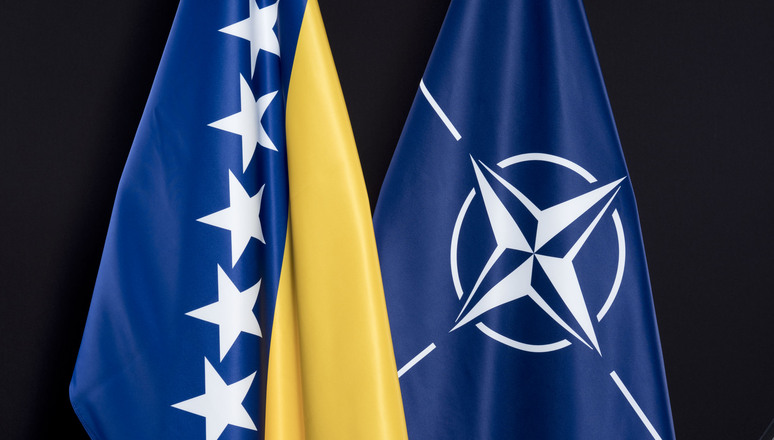The first interference of the North Atlantic Treaty Organization into Bosnian affairs dates from the beginning of the 1990s when they tried to bring to an end conflicts in the Western Balkans. Their role of the peacebuilding mission in Bosnia and Herzegovina reflects in assisting during the nine-year period (from 1995 to 2004) legally warranted by the Dayton Peace Agreement signed in 1995. Since 2004, responsibility for military issues has been taken over by the European Union and their conduct of the EUFOR Althea operation. This handover of duties does not mean the permanently absence of the NATO forces in Bosnia. Based on the Berlin Plus Agreement, NATO is obliged to provide necessary assistance to the European Union Forces in Bosnia and Herzegovina.
Bosnia and Herzegovina officially and legally seek NATO membership, which is approved by submitting the Annual National Program to the NATO Headquarters, which directly means adoption of the Reform Program. This step closer to NATO membership is enabled through the Membership Action Plan to which Bosnia was invited to join in 2010.
Lying between East and West, the position of Bosnia and Herzegovina in the international system is neither neutral nor determined. Internal political affairs connected to the attitude and political functions trading among three constitutional people led to the submission of the Reform Program in 2019 but, consequently, public denial of signing this document by a representative of the Serbian people in the Presidency of Bosnia and Herzegovina Milorad Dodik is still present. These internal turmoils put Bosnia and Herzegovina into torn position, which does not allow its statehood to be either politically or geopolitically oriented.
Considering the current situation in Europe and Ukrainian War, Bosnia and Herzegovina has never been more involved in rumors of rapid joining NATO to prevent itself from Russian interference and possible use of Russian hard power to achieve its long-term ideology of affiliation with the Western Balkans to create integral territory. Being a member of a defensive alliance such as the NATO would bring Bosnia and Herzegovina security in the international system and it will exclude all possible military attacks by Russia and pro-Russian states. This is for sure if we observe it from the top, but internally it can cause a lot of adversities. Internally, ethnic Serbs do not agree with any cooperation with NATO, which directly leads to membership, and can cause new conflict among people and it also would give the space for the realization of intentions related to the dissolution of Bosnia and Herzegovina. The latest question is whether the mandate of EUFOR Althea operation would be extended by the United Nations Security Council in November 2022. The point is that Serbian political authorities advocate „the walkout of foreigners“ in general as well as the military forces of the European Union. On the other side, if Russia vetoes the UN Security Council decision, the NATO forces have a legal right to take over the EUFOR Althea operation responsibilities according to the Dayton Peace Agreement. The EUFOR Althea operation is a legal successor of NATO’s SFOR operation in Bosnia and Herzegovina legally supported by the UN Security Council Resolution 1551 adopted in 2004.
No doubt that the Russian decision would have features of a double-edged sword and it would affect the interests of the pro-Russian side in Bosnia and Herzegovina whether they extend the mandate of the EUFOR Althea operation or veto the decision. The fact is that Bosnia and Herzegovina tightly cooperates with NATO and extends its military interoperability capabilities. The latest news from Bosnia and Herzegovina regarding meeting the requirements for NATO membership tells that the Armed Forces of Bosnia and Herzegovina in September this year underwent the most difficult test in their 16-year history, called NATO Evaluation Level 2, and they succeeded with a training score of “Excellent“. Militarily, Bosnia and Herzegovina is ready to join NATO thanks to its declared unit. Also, in the 2022 NATO Summit in Madrid member states agreed to provide all necessary assistance for developing a new defense capacity-building package.
NATO’s commitment to presence and maintaining peace and stability in Bosnia and Herzegovina will not be affected by any decision of Russia in the UN Security Council in November. On the other side, international society should be aware that Russia will not give up interfering in Bosnian internal affairs and will do anything to make Western foreigners leave politically and militarily that state. The period ahead and development of Ukrainian War will show us how Bosnia and Herzegovina is really close to NATO membership.


